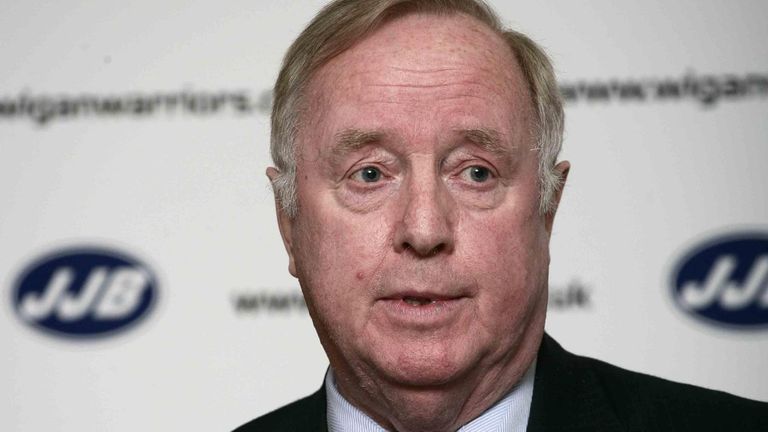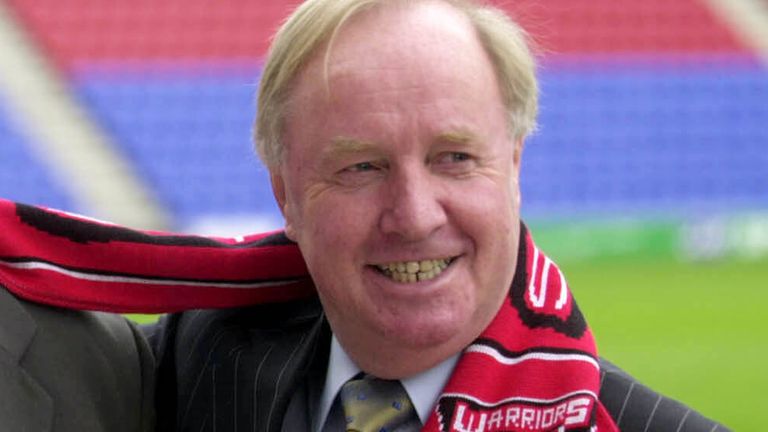
Phil Clarke
Rugby League Expert & Columnist
Maurice Lindsay: Phil Clarke on the former Wigan chairman and RFL chief executive's 'indelible mark' on rugby league
Sky Sports pundit and former Wigan player Phil Clarke reflects on the impact Maurice Lindsay made on rugby league; The ex-Wigan chairman and former RFL chief executive's death at the age of 81 was announced on Tuesday
Last Updated: 17/05/22 7:23pm

It is most common in sport for the stars to be players or coaches, but every 50 years or so a person comes along who makes an indelible mark on their favourite game without ever having crossed the white line.
They change the sport more than any player ever can, they of course make some enemies along the way, but they are remembered well after their involvement ends. Maurice Patrick Lindsay was certainly one of those (he had many nicknames, but we will stick to the one on his birth certificate!).
I first became aware of Maurice when my father, who played for Wigan in the 1960s and 1970s, became the second-team coach at Central Park. Maurice was one of the four directors of the club in the early 1980s, although clearly the most prominent and vocal.
He wasn't the one with the most money, but he was the one with the most charisma and he knew how to create interest in the team. He was a showman and a businessman in the early days of Wigan's rise from the second division and his time spent working as a bookmaker at horse and greyhound racing tracks had made him 'street smart'. He was quick between the ears, highly entertaining and not afraid to take a risk.
His name then became a word that could not be used in my house after he sacked my dad, who by 1986 had been promoted to the first-team position. Wigan had finished second in the table and missed out on winning the league to Halifax by one point, but Maurice had decided he and the club wanted more, and he made the move to bring in a new coach from Down Under.
I then jump forward two years at which point in time Wigan wished to sign me as a young player. I was 17 and keen to play for my hometown team, but my dad also has a presence so you can imagine the tension in the room when I turned up with him for the signing session! But Maurice had a charm which could deflect any drama, talk his way out of an awkward situation and usually leave you smiling.
The decision to invite the Australian champions Manly over to play Wigan in the UK in 1987, in what was the first official World Club Challenge match, was another one of his bold moves and the biggest sign to date that here was a showman who wanted to take rugby league to a higher level and a wider audience.

He was also instrumental in the game that Wigan played against Warrington across the Atlantic in Milwaukee in the late 1980s and by now had them as the No 1 team in the land. At one point, they had a similar level of awareness and exposure as Manchester United. He had helped to raise the profile of the team to a level that almost every taxi driver in London had heard of them.
On the field, he helped the coach to manage a group of players, some with egos bigger than the dressing room, to sustained annual success and managed to steer the team to more finals than their fans knew existed. There can be little doubt Wigan helped to raise the standards and profile of the sport during the 1980s and 1990s, and Maurice was a major player in that.
We often hear coaches talk glowingly about one of their players who is so competitive - Paul Wellens said as much about Jack Welsby last week. Well, there was no one more competitive than Maurice in his time at Wigan and I have no doubt he was a major player in why the Cherry and Whites lifted so much silverware at that time.
He was the Great Britain team manager in 1992 and was great fun, working well with head coach Malcom Reilly to give the team the best chance they had to win the Ashes.
I remember on a day off from training whilst in Papua New Guinea, we went out to sea on an old boat, and every player had to climb to the top of the mast and jump off. It was high, and to add to that someone said that there were sea snakes around the boat, so there was a bit of fear in the air and even players like Kelvin Skerrett did not look that confident.
After every player had anxiously done it the lads shouted that it was the staff's turn. Malcolm Reilly was up in a shot but one of the assistant coaches bottled out. Then Little Mo started the big climb to the top, closed his eyes and jumped. I think that from then on, he had the respect of the whole squad.
His drive and ambition did not fall when he left Wigan to become the boss of the sport at the RFL in Leeds. He was not afraid to make a decision and think big. He agreed to book Diana Ross to open the 1995 Rugby League World Cup at the first game in Wembley - the previous year she had opened the Football World Cup in the USA. She was a big name and yet he made it happen.
He networked better than anyone I have ever known and lived a life which contained a million great stories. I was fortunate a few years back to share a lunch in London with Sky Sports colleague Brian Carney, Maurice and Sir Michael Parkinson, who is a big rugby league fan and had attended many finals at Wembley when Maurice was the boss at RFL HQ.
We were sat in a brilliant restaurant in Mayfair, London, when Sir Michael started to tell us this great story about the time that he met Nelson Mandela. I sat there thinking 'I must try to remember this moment as it is a great story'. Then when he had finished, Maurice started to tell us about the time that he met Mandela and it was an even better tale!
There is no doubt that he will be remembered by many as a controversial character, but he clearly had a presence and even in the later years of his life, had the ability to strike fear into men who were twice his size. He had a razor-sharp mind and could control a room with his wit and personality.
The sport of rugby league will miss him, but knowing him as I did, he will be looking down hoping that the next generation can show as much drive and enthusiasm as he did for what he believed was the greatest game of all.
